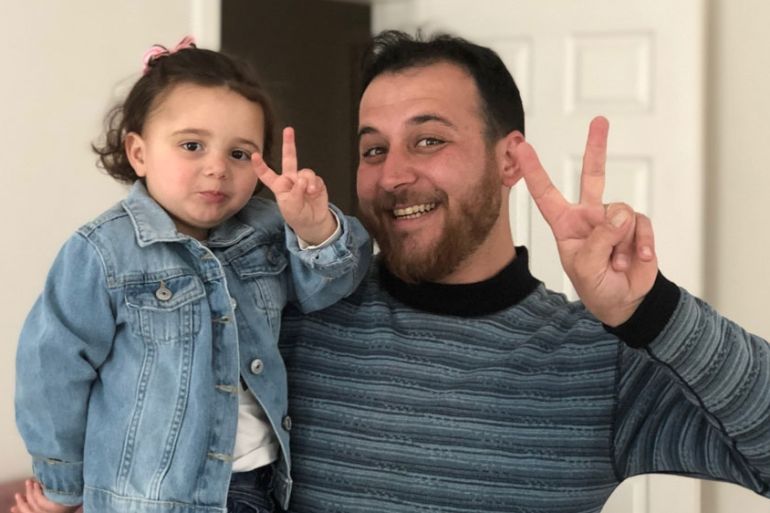Syrian girl who laughed at bombs displaced in Turkey earthquake
Salwa, whose father taught her to laugh at the sound of bombs to not be afraid, has lost her home once more.

The massive earthquake that rocked the southern Turkish city of Antakya on February 6 flattened entire residential blocks as well as the sense of security that the family of Abdullah al-Mohamed had taken so long to rebuild.
In 2020, the Syrian family was forced to move from their hometown of Saraqeb, as government forces battled to reclaim control of Idlib province, to the town of Sarmada on the border with Turkey.
Keep reading
list of 3 itemsSyrian refugees return home from Turkey after quake devastation
UN launches appeal for $1bn in aid for Turkey quake victims
As bombs dropped near their home amid a renewed offensive by government forces on opposition-held northwestern Syria, al-Mohamed taught his daughter Salwa, then three years old, to play a game so she would not be afraid.
A video of the bittersweet game went viral.
“A shell!”, Salwa squeals in the clip, proud to have identified the sound. “It’ll fall now, and we can laugh.”
The family eventually moved to Antakya. But three years after father and daughter exorcised death with laughter, their life in Turkey was shattered by a series of violent tremors.
“The earthquake was strong to the point that I tried to reach Salwa on the other side of the room, but it kept pushing me back,” al-Mohamed told Al Jazeera.
“You feel like you’re caught in between this life and the afterlife … you remember the good things and smile, you remember the bad ones and ask God’s forgiveness.”

As time stretched and moved in slow motion, he finally took his terrified six-year-old daughter into his arms and stumbled down the stairs alongside his wife.
“A wall had fallen and was preventing us from crossing. My neighbour was standing on the other side so I handed him Salwa but she was holding on to my neck … I had to remove her by force,” he said.
From the street, they looked back at their crooked building, the cold wind lashing at their faces and the rain soaking their pyjamas.
Then, another powerful earthquake rumbled and roared.
“I thought the earth was cracking beneath our feet, all around us buildings were collapsing,” he said.
“I didn’t know where to run. Every once in a while, we heard screams from the rubbles and people run to their rescue,” he continued.
Salwa started crying, as were many of the people frantically fleeing around her. Hours later, her father located a car where she could get some rest and warmth.
“She was frozen, both from the cold and from the fear, and from time to time she would vomit,” he recalled.
‘It felt like doomsday’
With few possessions except for a jacket that wasn’t his own, al-Mohamed set off with his wife and daughter to join relatives in the southern Turkish town of Mersin.
They found their hosts camping out in the street, too afraid to go home as hundreds of aftershocks periodically shook the ground.
“It felt like doomsday,” al-Mohamed said. “In Syria at least, when a strike took place we’d know where to run. Now the situation is different. The source of the problem is beneath you.”
The family looked for accommodation in a shelter, but none was available. No food or aid from humanitarian organisations operating on the ground has so far reached them.
Eventually, they were allowed to stay at a relative’s overcrowded home. They count themselves among the lucky ones.
“The family of my wife’s cousin is still under the rubble, it’s been nine days,” al-Mohamad said.
“A friend of mine has two kids, aged nine and 10, who are still missing.”
Coping with trauma
Since leaving behind yet another home, Salwa has had many questions.
“What happened? What does it mean that people are under the rubble? How do people survive under the rubble?” she asks her parents.
Her father wonders how much truth a child can tolerate. “In some cases, we answer her questions honestly. In other cases, we lie,” he said.
More than anything, he once again wants to shield her from trauma, but knows that laughing won’t be possible this time.
“In situations such as earthquakes, children feel that even their father is helpless. The father is always perceived as a hero, but in this case, she saw that everyone was helpless,” he said.
“We’re trying to bring things back to what God has in store for us in order for her to feel safe.”
The family applied for resettlement in Canada more than a year ago, but the final green light has been slow to come through.
With their possessions now under the rubble, al-Mohamed longs for a forever home where his child can laugh at ordinary things.
“The main issue is making her forget the earthquake. I’m not able to find a solution. I always find solutions to many things, but this one I cannot,” al-Mohamad said.
“Salwa is now six and a half but has not been to school yet. Hopefully, she will begin next year.”